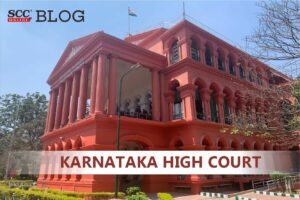Karnataka High Court: A Division Bench of PS Dinesh and Anant Pamana Hegde, JJ. rejected the appeal filed by Commissioner of Central Tax and considered that Customs, Excise & Service Tax Appellate Tribunal (‘CESTAT') was right in dropping the demand for extended period mainly on the ground that the details of trading were available in the balance sheet of the respondent during the relevant period and that there was much confusion during the relevant period as to whether credit could be availed in respect of trading activities.
ABB Limited (‘respondent') was engaged in the business of manufacture and clearance of turbo chargers, electric motor, transformer etc. falling under Chapter 85 of Central Excise Tariff Act, 1985 (‘CETA, 1985') and provides taxable output services such as management, maintenance, repairs etc. and for the purpose of payment of service tax they have obtained service tax registration.
Based on the intelligence report, a show cause notice was issued stating that apart from manufacturing, respondent was also engaged in trading of electrical goods under the trade name ‘ABB' and it had wrongly utilized the CENVAT credit in relation to the trading activity and was further called upon to show cause as to why Rs.5,68,00,000/- should not be treated as wrongful availment of CENVAT credit and recovered from it under Rule 14 of the CENVAT Credit Rules, 2004 read with proviso to Section 73 of the Finance Act, 1994 and proviso to Section 11-A of the Central Excise Act, 1944.
A reply was filed by the respondent holding that the CENVAT credit was inadmissible for trading activities, and it was disallowed. Further directions were issued for appropriation of the said sum in the CENVAT account, and it was paid under protest. On appeal, the Customs, Excise & Service Tax Appellate Tribunal (‘CESTAT') held that there was no suppression of facts on the part of the assessee with an intent to evade payment of tax and it confirmed the demand only for normal period i.e., disallowed appropriation of the payment made under protest and interest at applicable rate and penalty of equal sum holding that there was no evasion of payment of tax and set-aside the demand for the extended period of limitation and confirmed the demand only for the normal period. The penalty relating to the normal period was also set aside during the relevant period on the grounds that there was much confusion on the availment of credit for trading activities. Aggrieved by the same, the revenue ‘appellant' has filed the instant appeal.
Counsel for appellant Adv. Jeevan J Neeralgi, submitted that the assessee did not declare its trading activities in the returns and based on the intelligence report, the department learnt about the trading activities of the assessee. The findings recorded by the CESTAT in its order that the department was well aware of the trading activity of the respondent are factually incorrect. Though the said finding is a matter of fact, since it is perverse on the face of it, it amounts to a question of law.
Counsel for respondent Adv. Ravi Raghavan submitted that the show cause notice issued was on the basis of the balance sheet wherein all activities of the assessee were truly declared. Therefore, there was no suppression of material facts. Further, it is trite law that when an assessee has acted in good faith, invoking an extended period of limitation is not tenable.
Reliance was placed on Asst. Commissioner of GST v. Shriram Value Services Pvt. Ltd., (2019) 368 ELT 928 Mad. wherein it was observed
“it is clear that the position was clarified by the Government by insertion of Explanation only with effect from 1-4-2011 that the trading activity will be Exempted Services. The Explanation is clarificatory in nature and can be held to be applicable even for the past period. Thus, at the relevant period of time. Viz., from April 2009 to March 2011, the Assessee was, obviously, under bona fide belief in view of the conflicting decisions of the Tribunals during that period and taking the trading activity as Exempted Services, availed the CENVAT Credit which is sought to be reversed and recovered by the Department invoking the extended period of limitation. Such a bona fide belief cannot be held to be done with ulterior purpose for evading the Duty and therefore, the extended period of limitation would not be available to the Revenue Authority in view of the aforesaid decision rendered by the Hon'ble Supreme Court”.
The Court held that the substantial questions raised by the Revenue are answered in favour of the assessee. Hence, the appeal was dismissed with no costs. dismissed. No costs.”
[Commissioner of Central Tax v. ABB Limited, 2022 SCC OnLine Kar 1132, decided on 01-06-2022]
*Arunima Bose, Editorial Assistant has reported this brief.

